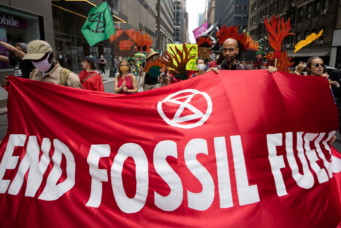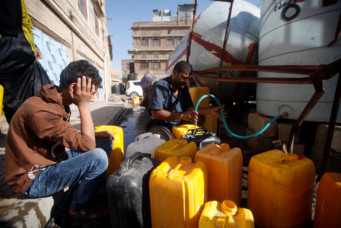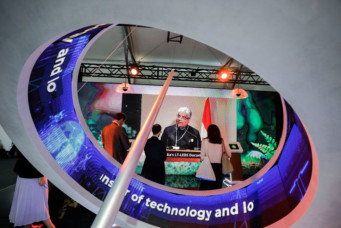Could the Future of Work be Green? Two Plot Twists
Given the pressures of climate change could “green” define the future of work? Why are green jobs limited and who is pushing for them to grow?

A Jordanian farmer looks through green peppers inside a greenhouse in Amman, Jordan, July 31, 2022. Jehad Shelbak/Reuters
There are multiple intriguing, often competing, narratives about the future of work. To some, it is digital, virtual, inclusively diverse, and overall promising. To others, it is scary, with machines taking over most of the work we thought we could do. Giant tech companies made much noise a couple of years ago by calling for universal basic income to compensate for anticipated job losses. Even creative writing, what we humans thought we could exclusively do, was threatened by the recent emergence of ChatGPT. One of the less circulated narratives about the future of work is that it can be green.
Lone voices about green jobs were heard after the global financial crisis of 2008, with efforts spearheaded by a number of international organizations including the International Labour Organisation (ILO) and the United Nations Environment Programme (UNEP). More than five years later, in 2013, the ILO offered a definition of green jobs during its Conference of Labour Statisticians, as jobs that are meant to “preserve or restore the environment, be they in traditional sectors such as manufacturing and construction, or in new, emerging green sectors such as renewable energy and energy efficiency”. They also noted that green jobs could help reduce negative environmental impact and lead to sustainable enterprises and economies. Green jobs have been heralded as the promising win-win scenario, reconciling the long competing objectives of economic growth and environmental sustainability.
The 27th Conference of the Parties to the United Nations Framework Convention on Climate Change (COP27), which was presided by Egypt in 2022, concluded with a historic decision to establish and operationalize a loss and damage fund. This is anticipated to stimulate interest in green investment and expand prospects for green jobs. In Egypt, 2022 has been a year of significant milestones including the issuing of the first comprehensive National Climate Change Strategy for the country (until 2050), which put mitigation costs at 211 billion dollars. The year also witnessed the establishment of the National Climate Change Council, a national Climate Change Measuring, Reporting and Verification (MRV) System, and the publication of a revised Nationally Determined Contribution (NDC) report.
However, green jobs have not been created in the numbers or pace that had been expected, and especially in the sectors where they were expected to grow such as the renewable energy industries. Moreover, enforcing green policies, which is key to creating and activating green jobs, fell short. A set of conditions can enable “green jobs” to grow, some of which require a rethinking of how we envision them and where they are most likely to be found.
Tying Green Policies to Green Jobs
Green jobs are driven by green policies. In fact, green jobs only happen in contexts where there is strong enforcement of green policies. Such an enforcement creates the demand for green skills and green jobs. In a more recent iteration of the definition of green jobs, the ILO and UNDP directly linked green jobs to green policies and offered a typology of green jobs as: (i) direct jobs created in green industries, such as wind and solar electricity; (ii) indirect jobs created in the rest of the economy due to demand of goods and services as a result from the green policies and growth of green industries; and (iii) induced jobs created in all industries due to growth of income resulting from the green policies, which boost household consumption. The main source of green employment is ultimately the links between the economy and the environment.
Some have argued that we need not look too far for green jobs. A green transition would mean that some jobs will be reduced or even eliminated, such as packaging, particularly using plastics.
However, there is also the expectation that a green transition will lead to many jobs being gained. These include, but are not limited to, pollution control officers and environmental standards experts in all fields and at different levels of enterprises. Some jobs will be transformed. For example, a driver might shift from vehicles that are built on fossil fuel technology to vehicles operating on renewable energy. Another example is in plumbing, which will have to rely on new skills in water recycling and water management to reduce the depletion of environmental resources.
Plot Twist 1: The Prospective Marriage of Green and Traditional Jobs
A key plot twist is that there is also a growing consensus that green jobs do not necessarily need to be in new unconventional sectors and that they can be found in some of the most conventional ones. Agriculture presents an interesting example of the potential for creating green jobs in a conventional sector. This seemingly green sector—at least plants are green—is a major part of the climate problem and needs to be the central focus of greening policies.
Agriculture stretches the use of natural resources including soil and water, and negatively impacts biodiversity. In a country that is water-poor like Egypt, agriculture is responsible for more than 80 percent of water consumption.
Agriculture is also a major source of greenhouse gas emissions, thanks to the livestock sector. This sector is globally responsible for almost half of human-induced methane emissions from cattle and the fermentative processes in manure.
The growing consumption of meat and dairy products is a key contributor to the environmental footprint of the sector. Agriculture is also a highly vulnerable sector to climate change. Extreme weather events and the depletion of water and soil resources all affect crop production. With the growing pressures to increase crop yields to meet population demands, the sector increasingly contributes to climate change and then becomes most affected by its adversities. In Egypt, threats of water poverty and the increased salinization of the Nile Delta due to rising sea levels are projected to have a serious impact on food production in the country.
There is great hope for green jobs in agriculture. Countries in the Global North, or in other words rich countries, have long reckoned with the fact that agriculture is a knowledge-intensive sector. Research on technologies for seed varieties, soil management, water resource management, and crop protection has long thrived in these countries. Digital technology has been increasingly used in agriculture including the reliance on remote sensing data, digital advisory systems, and digital platforms for trade and supply chain support in the sector.
Investment in these technologies has contributed to job gains and to attracting talent to a sector that has traditionally lost workers to industry and services. According to Eurostat, agriculture remains a big employer within the European Union, with 17 million people working in the sector in 2020, both in full-time and part-time jobs, which is calculated at the equivalent of 8.2 million full-time workers.
There is an opportunity for countries in the Global South to benefit from this experience and to attract investments in greening the agriculture sector. These countries are burdened by population pressures and are not supported enough in areas of research and development capabilities.
Knowledge transfer and contextualization remain a key recommended approach in this context, factoring in both indigenous knowledge and science. Climate Smart Agriculture, an initiative supported by the World Bank, for instance, seeks to capture the essence of such efforts by focusing on the three-fold objective of increasing agricultural yields; enhancing resilience to drought, pests, diseases and other climate-related risks and shocks; and reducing emissions. A gendered focus of these policies is of paramount importance since climate change impacts men and women differently. Women’s role in agriculture is least recognized, which puts women farmers at a disadvantage in access to different agricultural inputs.
While there are great prospects for green jobs in conventional sectors like agriculture, renewable energy has not really been creating the number of green jobs that was previously envisioned.
According to a recent report by the International Renewable Energy Agency (IRENA), this sector has globally provided only 12.7 million jobs in 2021. China alone created almost half of these jobs. China’s job creation is in the manufacturing of renewable energy-related products, primarily in the solar sector. China is followed by Brazil, the United States, India, and Indonesia. Each of these countries has its own renewable energy job profile. For example, hydropower has been the sector that created most jobs in renewable energy in Indonesia. Arab countries are quite lagging in adding jobs in renewable energy, with Jordan being described by IRENA as the largest country with jobs in renewable energy in the region, estimated at 50,000 in 2021.
Plot Twist 2: Green Jobs Don’t Have to be “Green”
Another major plot twist is that green jobs are not only about saving the environment. The ILO insists that environmentally responsive jobs in some sectors are not necessarily green. In the 2013 definition of green jobs, the ILO starts by defining these as “decent jobs”. The decent work agenda has five main components: income security (in terms of level, regularity, and predictability); employment security (existence of employment agreement is key); health and safety issues; access to reasonable hours of work (not too short and not too long); and skill building prospects.
However, this definition presents a challenge. Work opportunities associated with environmentally sustainable practices and outputs are only considered green if they also comply with the job quality standards set by the ILO’s decent work agenda. Informal jobs, for example, that contribute to improving energy efficiency or minimizing waste and pollution cannot therefore be considered green jobs because of their decent work deficit. In this fashion, low-wage earners working informally in the recycling sector or in the installation of solar panels do not participate in green jobs.
Even though they are contributing to environmentally friendly activities, their employment cannot be classified as “green” since their jobs are not defined by the conditions of decent work.
Green jobs might constitute a narrative of hope about the future of work amid fears about the potential repercussions of climate change. However, green jobs require a deliberate course of policy action by governments to steer economies toward a green transition. Green jobs need policies to support a green transition in different sectors, and cannot be created without them. Such a transition is urgent under the quickening pace of climate change. Although hopeful, the green jobs narrative should be treated with caution like all other narratives because its implementation hinges on so many factors.
Ghada Barsoum is Associate Professor (with tenure) and currently Chair of the Department of Public Policy and Administration at the American University in Cairo (AUC). Her research interests include gender, employment, social policies, and higher education. Barsoum has numerous publications in reputable international peer-reviewed journals including Review of Public Personnel Administration; International Journal of Education Development; Gender, Work and Organizations; International Journal of Social Welfare, and Current Sociology. She is also author of a book on the employment crisis of female graduates in Egypt, and a number of book chapters, technical reports, published policy papers and encyclopedia entries. She has consulted for the International Labor Organization, UNESCO, UNFPA and UNICEF. While at AUC, she has been the principal investigator of projects with funding from the Ford Foundation, the United Nations Development Programme and Friedriech Ebert Foundation. Prior to joining AUC, Barsoum was Research Associate at the Population Council, West Asia and North Africa Office, where she spearheaded efforts for a national survey on youth in Egypt. Barsoum obtained her PhD in Sociology from University of Toronto and her Master’s degree from AUC.
Read More



